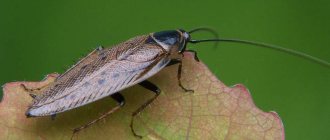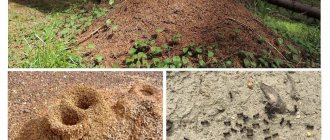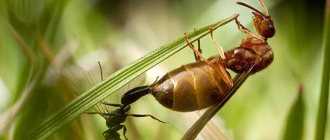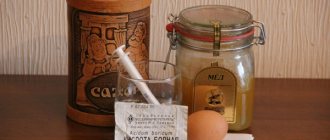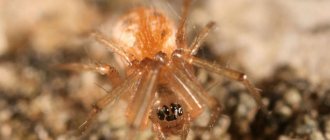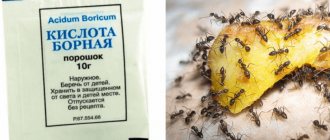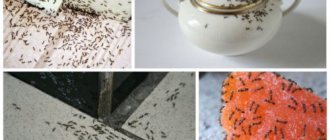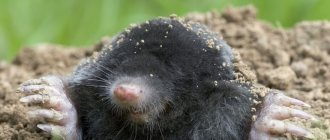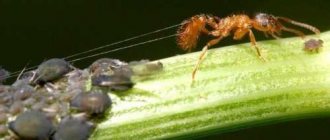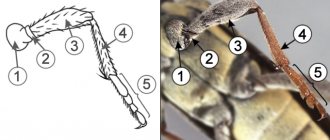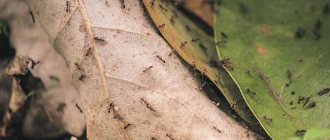- Reports and messages
- Insects
- Ants
Ants are the most developed and powerful insects.
They are also the oldest, because they appeared about 100 million years ago and lived together with dinosaurs. But unlike them, they have survived to this day. There are 12 thousand species of these animals on the planet! Some of them can reach 5 centimeters in length. For insects, this is quite an impressive size.
Many people believe that termites are related to ants. But this is not true! Termites are closely related to cockroaches, and ants are closely related to bees.
There are as many as 10 quadrillion of these animals on the whole Earth! This is 1 million more than people. The world's largest ant colony is home to more than a billion of these insects.
Scientists believe that an ant can lift 5,000 times its own weight. If a person had such strength, then a 6-year-old first grader could lift a load weighing 100 tons!
Ants are divided into three groups: female, male and worker. The queen ant can reign for up to 30 years, but the worker lives only 3 years.
Ants are very good tacticians. They have their own “scouts,” and during battles they put the weakest in front and the strong behind in order to wear out the enemy.
There are only two species of organisms in the world that have domesticated others. This is a man and an ant. Yes, you heard it wrong, ant. They have tamed the aphid and constantly milk it, because the substance it secretes is consumed by the ants as food.
Ants can build a bridge out of themselves in order to overcome some obstacle.
Workers are not allowed to eat what they find. They are obliged to bring the prey to the anthill and there the food will be fairly distributed. If an ant stops bringing food, it can be killed.
In Mexican cuisine, the dish escamoles contains ant larvae. Ants protect each other. If someone is sick, his brothers take turns licking him to kill the infection.
Nowadays, it is becoming popular to have ants as pets. You can buy an ant farm for your home, where these animals will live.
Report Ants message
Ants are social insects that live in large families. There are three varieties: males and females, which have wings, and wingless workers. They build their homes - anthills - in the ground, near stones or trees, often in the wood itself. Sometimes some ants take over the nests of other ants. These insects also settle in human homes. Nomadic ants are common in South America. These insects are not found only in Antarctica; there are about 14 thousand species of them.
They eat the sap of plants, as well as the honeydew of aphids and other insects - the sweet juice that they leave on the leaves. Another favorite delicacy of ants is other insects, which they attack or collect corpses. That’s why they were called “forest orderlies.” They also eat mushrooms and seeds. The food obtained is distributed in the anthill among all relatives. Ants live in close “cooperation” with aphids, which secrete honeydew - their food. They protect the aphids, transfer them to a new place when the colony migrates, and also touch with their antennae, in response to this the aphids secrete honeydew.
Ants are very smart insects, their family is a complex social group where everyone performs their own duties. They can transmit complex information to each other and coordinate their actions when performing various tasks.
The size of the ant varies depending on the species from 1 to 50 mm. These insects are classified as Hymenoptera, so their closest relatives are bees and wasps. According to one version, they originated from wasps. But termites are not related to ants; they are closer to praying mantises and cockroaches. A distinctive feature of ants is their articulated antennae. With their help, ants analyze substances with which they come into contact, and also “communicate” by touching. The body is covered with a shell of chitin, which serves as an exoskeleton. Compound eyes instantly react to any movement, but the ants themselves do not distinguish objects well.
Before developing into an adult insect, the ant goes through the egg, larva and pupa stages. Worker ants monitor and feed the larvae. When a family grows greatly, it is divided, usually once or twice a year. Ants in the tropics are active all year round; in cold regions they are dormant in winter. An ant queen can live 20 years, the lifespan of worker ants is from several months to 3 years, but the males die after mating, so they live only a few weeks.
The role of ants in nature is enormous. They spread the seeds of tropical trees. There are birds that sit on anthills and spread their wings so that the ants clean them of parasites. Ants are food for pangolins, anteaters, as well as lizards and poison dart frogs. Birds, such as woodpeckers, also love to eat these insects.
These insects help loosen the soil, they mix and fertilize it. By setting up anthills in old stumps, they thereby destroy them, speeding up their disposal. They also fight insect pests. In some countries they are eaten.
In human homes, ants can spoil meat and sweet products; there are poisonous representatives. For example, red fire ants. Some species are endangered and protected by law.
Peculiarities of reproduction and ant wintering
As for the process of reproduction of ants, it is rightfully considered quite effective. The production of offspring in an anthill is carried out by only one female, which is called the queen or uterus. Since she is constantly in the anthill and never leaves it, she is the one who lays eggs and cares for them. In addition to the queen, there are other females in the anthill, but none of them can reproduce.
The appearance of offspring in ants occurs only once a year, when young males and females emerge from the pupae.
If ants live at home, then their life activities occur according to completely different rules and laws.
For the winter, ants insulate the anthill
I would also like to note that ants do not hibernate at all in winter, and their lives continue to follow the same course. These insects remain to spend the winter in the same anthills; the only thing they do to prevent them from feeling cold in winter is to insulate them.
In winter, these insects are not particularly active, so much less food is needed for their existence.
Ants can survive even at particularly low temperatures
The reproduction of ants occurs quite rapidly, which is why there are a huge number of individuals in anthills.
Option No. 3 Report about Ants
The world of insects is so diverse that every year people make more and more discoveries for themselves, getting acquainted with new species of representatives of this part of wildlife and their activities.
Of great interest among them are small, restless ants, whose lifestyle also interests children. Ants live in groups, as it is very difficult for them to cope with difficulties alone. The family size can range from several tens to millions of insects. Far from their group, their life expectancy decreases. This is due to an increase in the activity and performance of a solitary ant. Performing more movements alone, due to fatigue, his strength becomes less, and the time of their existence is reduced.
A large number of ant species are distributed everywhere. They are able to tolerate any climate zone, with the exception of severe cold and hot deserts.
Like any insect, ants prefer to have a cozy corner where they can always return. Their home is called an anthill. The favorite place for its construction is rotten wood, which looks like a heap or mound. There are countless passages inside the home, and the required temperature regime is also maintained there. Some of them find a place under stones and can fearlessly live in plain sight of people.
All this speaks about the nature of ants, which are capable of different types of activities. The efficiency of insects surprises both children and adults. The moments of movement of an ant with a burden larger than the insect itself become a close subject of attention. They are friendly among their relatives, each of whom has their own responsibilities.
The diet of ants is varied. It is based on both plant and animal foods. Everything that is eaten is divided between them in the nest. This could be dead insects or leaf juices. They are attracted to nectar and mushrooms, and bred aphids. Some species are considered omnivores.
The external color characteristics of this insect are varied. They are characterized by shades of yellow, black, and brown. The size of the ant is small, 2-3 millimeters.
Its structure is represented by three parts. Head with large eyes and antennae. There is a thin waist between the abdomen and chest. Thin, seemingly fragile, ant legs are protected by claws. With their help, he tenaciously grabs the found object and carries it. In addition, they facilitate easy upward movement.
Nature has endowed the small creature with a way to protect itself from the enemy: it uses formic acid, which it sprays out with special glands that are poisonous.
The residence of some species of ants near humans causes some harm to garden plants, spreading aphids, which are sometimes very difficult to rid plantings of. However, by eating some garden pests, they save the harvest. They are sought after by some bird species as food, for example, woodpeckers and wood grouse. In the steppes they disperse various seeds, from which snowdrops, violets, and celandine appear. In the process of building their home, thousands of insects simultaneously loosen the soil, the quality of which noticeably improves, and it becomes suitable for planting.
Human health is also sometimes subject to undesirable effects. This is due to the fact that insects become unexpected visitors to the house. With their presence they spoil food and are carriers of diseases. Known all over the world, “formic alcohol” is a cure for people’s ailments (asthma, diabetes).
Having enough information about ants, you can learn to understand their methods of survival, have an idea of their activities, and what danger they pose. Such knowledge teaches how to treat these insects correctly.
1st, 2nd, 3rd, 7th grade, the world around us briefly. In biology
Leave your comment
The Quacquarelli Symonds ranking of the best universities in the world includes 48 Russian universities
Reading time: 1 minute
Samara students will be taught by a robot
Reading time: 1 minute
In China, all books that “glorify Western values” will be removed from school libraries
Reading time: 1 minute
An Italian teacher gave children a summer assignment and became famous
Reading time: 4 minutes
Rosobrnadzor: almost half of teachers do not reach the basic level of training
Reading time: 2 minutes
16 Russian universities are included in the international QS ranking for the first time
Reading time: 2 minutes
Gift certificates
Responsibility for resolving any controversial issues regarding the materials themselves and their contents is taken by the users who posted the material on the site. However, the site administration is ready to provide all possible support in resolving any issues related to the work and content of the site. If you notice that materials are being used illegally on this site, please notify the site administration using the feedback form.
All materials posted on the site were created by the authors of the site or posted by users of the site and are presented on the site for informational purposes only. Copyrights for materials belong to their legal authors. Partial or complete copying of site materials without written permission from the site administration is prohibited! The opinion of the administration may not coincide with the point of view of the authors.
Source
Popular message topics
- City of Kazan
Eight hundred kilometers from Moscow, on the banks of the great Volga River, there is a large and ancient city, which is called the third capital of Russia. This is Kazan, the main city of the Republic of Tatarstan, a link between two cultures, east and west. - City of Blagoveshchensk
The city of Blagoveshchensk is the only city of regional significance located on the border of Russia. The city is located on the Amur River, on the left side. From Blagoveshchensk to Moscow 7985 kilometers. - Table setting
Table setting plays a very important role not only during festive feasts, but also at home. The prepared dish will seem even tastier and more appetizing if it is presented beautifully.
Good to know
Continuing to list interesting facts about ants, it is worth noting a number of interesting nuances:
- According to rough estimates, the total mass of all these insects living on Earth approaches 22% of the weight of all biological material on the planet.
- As a result of mating, the fertilized winged female, in need of nutrients, independently tears off and eats her own wings, after which she begins the process of laying eggs.
- Ants have a biological navigation system with which they are able to navigate the easiest routes to food, as well as find their way back to the anthill. The operation of this system is based on pheromone activity. This also explains the tendency of ants to move in a line.
- The lifespan of an ant does not exceed 9-10 weeks.
- The basis of communication of these insects is a system of tactile contacts and sound signals produced by the crackling of their paws and antennae.
- Some ants demonstrate the skills of great military strategists. An entire colony can be conquered by introducing a parasitic queen into it, which kills their native queen, absorbs her smell and begins to produce larvae of its own species. They are gradually displacing the native inhabitants of the colony.
- Some species of ants have not changed at all over millions of years of evolution. An example is the honey ant. It is completely identical to its ancestor who lived during the time of dinosaurs.
- Ants are capable of punishing guilty relatives. If a “worker” repeatedly appears in an anthill with nothing, he himself can be used for food. Or expel from the colony.
- has antiseptic properties. It is also able to repel parasitic insects.
In fact, you can still list many interesting facts from the life of ants. But the ones above are considered the most entertaining. However, even after getting acquainted with them, many are surprised - such small creatures, but they are of such great interest.
Almost forgot, still interesting
- http-equiv=Content-Type content=text/html,″,>,l http-equiv=Content-Type content=text/html,charset=UTF-8″,>,ass=featured-entries-col featured-related -posts>,
- Animals
Touching cartoon about the friendship of a kitten and a dog
Notagram.ru never tires of admiring the true masterpieces of short animation. Today we came across an incredibly cute and...
- Animals
How to name a dog: 200 dog names with meaning
When a long-awaited four-legged family member finally appears in your home, one of the first questions is...,
- Animals
According to statistics, every second animal or bird living in the city dies from cold and hunger, if...,
Hardworking farmers
South American mushrooms are cultivated to provide the colony with protein food. Large porters bite off fairly large pieces from tree leaves and
deliver them to the anthill. Small ants, which never leave the colony, chew these leaves and mix them with excrement and mycelium. This mixture is then placed on special “beds” where the mushrooms develop. It is interesting that leaf cutters do not eat the fruiting bodies of mushrooms, but bite them off and throw them away, preventing the mycelium from wasting nutrients. They feed on the mycelium itself. The fertilized female, leaving the nest, places a piece of mycelium in a pocket on her head and takes it with her. This reserve is the guarantor of the survival of the new colony.
The symbiosis of aphids and ants is beneficial to both parties. Ants carefully protect their “cows” from other insects and take care of them in every possible way. In return, the aphid gives the ants a spandrel - a sweet secretion that is released as soon as the ant tickles its abdomen with its antennae.
Social organization
The division of labor between all individuals of the family ensures coordination of the implementation of assigned tasks and goals
Adaptation to the environment
They easily adapt to changes in the environment and place of residence - their high level of organization allows them to quickly and efficiently carry out resettlement and development of a new territory. They also have the ability to master all kinds of resources - soil, wood, stones, foliage.
Hard work
Observers are always surprised by this property of insects, since from the outside it looks like chaotic movement. However, each individual has a specific task, which it hurries to complete flawlessly:
- building a nest,
- security,
- maintaining order and cleanliness,
- food preparation,
- worries associated with caring for sick family members and future generations,
- other daily work.
If it is noticed that a worker is working and performing his duties poorly, such a member of the colony will be immediately expelled. Similar demands are put forward to the queen: if there are few offspring, the queen will be re-elected.
An amazing fact about ants can also be confidently called the ability of these little workers to lift a load weighing tens of times their own.
Training the younger generation
Among the inhabitants of the nest there is a certain category of insect mentors who select and train the growing individuals. Students repeat classes and practice skills with their teacher, the tasks are constantly becoming more difficult.
Wars and slaves
Some species in families have a separate category of slave individuals - these are captive pupae captured during an attack on another nest. They are assigned the same functions as in their own family.
Burial
In order to prevent the spread of diseases and infections and to maintain the cleanliness of the nest, responsible workers move the bodies of dead family members outside the anthill. The scientific name for this process is necrophoresis.
Caring for fellow tribesmen
Ants tend to take care of sick or weakened family members; they provide them with food and drink until they recover.
Anthill multi-storey house of little workers
An anthill is not a pile of needles, twigs and sticks, but a well-built dwelling. The above-ground dome protects the house from wind and rain; larger branches are located inside it. A constant temperature is maintained inside the anthill - about 28 degrees. Ants overwinter in the underground compartments of their home. There are also special compartments: a kindergarten for larvae, pantries for storing food, a kitchen, royal chambers for the queen, a vegetable garden, an operating room for sick ants, etc.
All worker ants are females that develop from fertilized eggs. Males develop from unfertilized eggs. Each ant clearly knows and performs its function. The teachers take care of the larvae, the cooks prepare the food. Moreover, some ants very carefully clean, for example, a grain and take it whole to the kitchen. And others hold it with their jaws until the worker ants, pinching off piece by piece, are full. If the grain is too dry, the cooks take it to a special compartment with high humidity, where the grain gets wet and becomes ready to eat. For the larvae, the grain is ground into powder and moistened with saliva. All garbage from the kitchen and nursery is immediately removed. If one ant cannot cope with the work, others will definitely help him.
Surgeon ants help those who, for example, have injured a limb in a fight, gnawing off the damaged part.
If a foraging ant returns several times without prey, it itself is allowed to feed. But if an ant is injured in a fight with other insects, then it is looked after like a veteran and fed.
Gravediggers make sure that there are no dead ants in the anthill. They do not detect them immediately, but only when a special smell begins to emanate from the dead insects, due to the secreted enzymes. The discovered corpses are immediately removed from the anthill. It is noteworthy that if such enzymes come into contact with a living ant, it is also carried away. And no matter how many times the ant comes back, as long as the smell is there, it is removed again and again.
Quantity matters
deservedly occupy first place in the world among insects in terms of number of individuals. This fact was recorded by entomologists as a result of approximate calculations. Today, between 1 and 10 quadrillion ants live on the planet.
Interesting!
If we distribute this number among all people living on Earth, then for each person there are about a million individuals.
In some areas, the population density of ants is off the charts. Christmas Island in the Pacific Ocean has more than 2 thousand individuals on every square meter of land and about 10 entrances to the anthill. In the western part of Africa, about two billion ants and more than 700 thousand of their nests live on every square kilometer of area.
Ant description, characteristics, structure. What does an ant look like?
In the structure of the ant's body, there are three components covered with a chitinous shell: the head and the chest and abdomen connected to each other by a thin waist. The eyes, which are made up of multiple lenses, can detect movement but do not provide a clear image. There are 3 more simple eyes at the top of the head. Ants move with the help of six thin legs armed with claws that allow the insect to climb upward. The segmented antennae located on the head are organs of touch and allow them to capture odors, air currents and soil vibrations.
Smell plays a big role in the life of ants: with the help of smell, ants distinguish members of their community from other insects, learn about the location of food, and sound an alarm or call for help. Ants protect themselves from enemies by using formic acid or poison, which are produced by special glands. For defense, the powerful mandibles of the ant are also used, which allow them to injure the enemy.
The size of ants and the structural features of the insect depend on the species, as well as the status occupied in the colony, and range from 1 mm to 3 cm. In some species, females are the largest individuals, in others the size of females does not exceed the size of working individuals. Females have wings that fall off after the mating season. The color of ants can be absolutely diverse, ranging from red, yellow, black and brown, to green and bluish colors.
